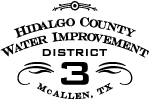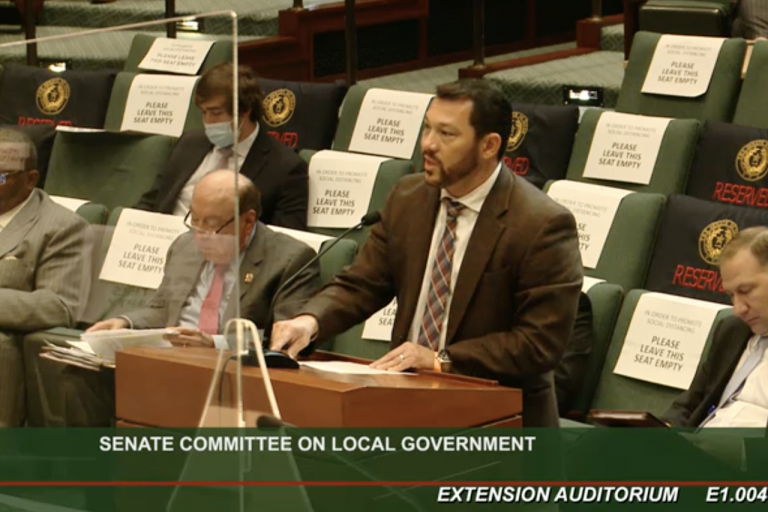MCALLEN, Texas – Rio Grande Valley farmers are making a last-minute plea to state lawmakers to kill legislation from state Sen. Juan Hinojosa that would abolish a local water district.
Senate Bill 2185 seeks to dissolve Hidalgo County Water Improvement District No. 3 and transfer its assets and liabilities to the City of McAllen. McAllen city commissioners have yet to pass a resolution saying they want to take it on.
Hinojosa, a McAllen Democrat, has filed similar legislation in three previous legislative sessions and each time farmers and irrigation district managers from the Valley have been able to thwart it.
Brian Jones, president of Hidalgo County Farm Bureau, is hoping to achieve a fourth legislative victory over Hinojosa but knows the veteran lawmaker is determined to finally get his way.
Jones said SB 2185 is currently being considered by the House Committee on Calendars. He said he has written to the chairman of the panel, state Rep. Dustin Burrows of Lubbock, urging him to kill SB 2185.
Asked why his group wants the legislation quashed, Jones said: “First of all it directly impacts some of our board members and it also directly impacts other Hidalgo County Farm Bureau members that don’t serve on our board. We think it is a terrible bill.”
Jones said local farmers “stand in opposition” to claims by Hinojosa that HCWID No. 3 has outlived its purpose.
“The district is fulfilling the very purpose it was designed for 100 years ago. And that is to deliver raw river water to the farmers and the municipalities inside its boundaries. It does that today just like it has always done.”
Asked to respond to claims by supporters of SB 2185 that most of the raw water pumped out of the Rio Grande by HCWID No. 3 goes to the City of McAllen, Jones said:
“It does serve farmers. They (HCWID No. 3) are still delivering water almost daily to farmers. And the city gets its water piggy-backed for free. The district is not charging them any conveyance from the river to the city’s pump because it is all still being carried by the farmers’ water. It takes a certain amount of water to quote, unquote, prime the pumps from the canals to get the water from the river to the city. None of that is ever deducted from the city’s account and the city is not charged extra for that because they are also pushing water all the time to the farmers.”
Asked to respond to Hinojosa’s claim that farmers will be protected under his legislation, Jones said: “I agree that the bill says that but once it is turned over to a non-electable board, i.e., the city commission, then what is the recourse for the farmers when all of a sudden there are no penalties or provisions, no protections for any of the farmers to say they will continue to receive Ag water? There are no provisions in there for the day that they quit delivering water to the farmers.”
Jones said farmers are also concerned about the schedule the City of McAllen would provide for delivering water, should the city get hold of the water district’s pump station.
“They could decide the farmers can have water on a Tuesday and Thursday and we are not going to do anything else. You have got valuable citrus crops, you have got vegetable crops. You have got everything else that is demanding of irrigation water and now you are going to turn it over to a Public Utilities Board who doesn’t care one bit about that plight. You have got the water that has to be delivered there to those crops. It is very timely and needs to be able to get there, which it does today.”
Asked how many farmers HCWID No. 3 serves, Jones said: “It is at least 12. But the thing of it is, one guy, one farmer may have a thousand acres still, in that district. So, he gets counted as one person but he has got a thousand acres worth of water that needs to be delivered. It is not one person with one little water spigot like it is at the house, with one little water meter. They are wanting to count every water meter in the city of McAllen and compare that to one person, one farmer, when the farmer may have hundreds or thousands of acres still in that district.”
Asked if farmers are concerned that other cities in the Valley will want to follow McAllen’s lead and take over their water districts, Jones said: “Absolutely. That is the reason Hidalgo County Farm Bureau is fighting so hard. I am a farmer as well. I don’t farm in District 3. I farm in District 9 but I think it is a terrible precedent to be set.”
Jones urged state lawmakers should steer clear of “a very controversial” piece of legislation.
“I will tell you one thing. If you read the language in the bill in plain English, the way I read it, it is a story about two entities that don’t play well together. Okay, you’ve got Entity A, which is the City of McAllen, who is mad at Entity B, the water district. And they are running to Mommy, the state Legislature, saying I want that toy, I want that toy, I want that toy. What they are trying to do is transfer all the assets and everything from one legal government entity, and do it by legislative fiat, taking it away from one legislative entity and giving it to another legislative entity.”
Asked if that should be prevented, Jones said: “How can that be allowed? They are completely dissolving one totally functioning governing body, locally elected, going around any other process and just going straight to the legislature and saying, dissolve this thing so we can have their toys.”
Asked what chance the farm bureau has of defeating a very powerful and experienced legislator such as Hinojosa, Jones said he did not know.
“We will continue to fight this tooth and nail, however we have to do it,” Jones said. “This is the fourth time they have tried to do this. We are the voice of Hidalgo County agriculture and we are trying to make our voice known.”
Hinojosa has a very different take to Jones on the relevance of HCWID No. 3. He released the following statement when he filed SB 2185:
“There is no greater waste of taxpayer money than the continuation of the Hidalgo County Water Improvement District No. 3. This irrigation district was founded in 1921 to provide water to serve agricultural interests, but now serves less than 10 active farmers. Its biggest customer is the City of McAllen, nearly 150,000 in population, which accounts for almost 85 percent of the district’s operating revenue. The district has outlived its purpose and simply serves as an expensive middleman driving up the cost of supplying water to citizens and businesses in the City of McAllen at nearly $1.3 million per year.”
Hinojosa also claimed there was mismanagement by the water district’s board of directors and general manager.
“Year after year the citizens of McAllen support an obsolete, burdensome, and unnecessary layer of government. The Hidalgo County Water Improvement District No. 3 has outlived its purpose, lacks proper oversight, and is an unnecessary waste of taxpayer funds. It is time to dissolve it and transfer the operation to the City of McAllen,” Hinojosa added.
Among the tactical battles Hinojosa has won so far are getting the bill through the Senate without discussion on the Senate floor. He scored another when the bill arrived in the House of Representatives, getting it sent to the Committee on Urban Affairs, rather than the Committee on Natural Resources. Natural Resources would have seemed the logical place for the bill to be considered given that an identical companion bill authored by state Rep. Terry Canales – House Bill 4620 – is parked there. However, because Canales has been unable to get a hearing for his bill, he worked to get Hinojosa’s legislation heard by Urban Affairs.
Asked why he wanted HCWID No. 3 abolished, Canales told the Rio Grande Guardian: “It is common practice that members from opposite chambers carry each other’s bills as legislative courtesy. This is one of Senator Hinojosa’s priorities, and therefore it is one of mine.”
There was no opportunity for public debate on Hinojosa’s bill in the House Committee on Urban Affairs. Instead, its chairman, state Rep. Philip Cortez, a Democrat from San Antonio, considered the legislation on the House floor, where public testimony or state agency testimony is not permitted. This angered the board of HCWID No. 3 and the Hidalgo County Farm Bureau.
Othal Brand, general manager and president of HCWID No. 3, said irrigation district managers and farmers were all set to hire a bus to go to Austin to testify against SB 2185.
“There was a big contingent that wanted the opportunity to speak to the other side of this issue. Legislators are not getting the opportunity to hear from the farmers or the irrigation district managers,” Brand said.
The Rio Grande Guardian reached out to the chairman of the House Committee on Urban Affairs, state Rep. Philip Cortez of San Antonio, for a response to criticism that he had prevented opponents of SB 2185 from voicing their opposition. After the Guardian submitted questions to Cortez, it received a text response from Hinojosa.
Hinojosa claimed the author of this article is not qualified to report objectively simply because I lived briefly in a property owned by the water district. In exchange for rent, I provided security for the facilities located at a high-drug and migrant traffic area on the border. This commercial agreement was simply a matter of business and does not disqualify me from providing fair journalism. Further, Hinojosa and other members of the Texas legislature consistently take cash donations from business interests to promulgate laws that help those businesses, which would definitely be a conflict under Hinojosa’s implied definition in his note to this reporter.
In his response, Cortez said there was insufficient time for a hearing that would have allowed testimony on SB 2185.
“The House Committee on Urban Affairs, May 7, 2021, unanimously recommended to the full House that Senate Bill 2185 by Senator Hinojosa be passed. The committee acted completely within the rules of the House and the Open Meeting Act. Any suggestion otherwise is incorrect and ill-informed,” Cortez told the Rio Grande Guardian.
Cortez said notice of the formal meeting was made in compliance with Rule 4, Sec. 11(b) and Rule 4, Sec. 11A of the House Rules. Additionally, he said, the meeting was open to the public in accordance with Rule 4, Sec. 12 of the House Rules.
“It was clear from the testimony in the Senate that most of those testifying in opposition had no direct connection to Hidalgo County Water Improvement District No. 3. In fact, no one representing the district testified,” Cortez said.
This last point is not correct, said Brand. “Lance Neuhaus is a farmer who farms within the district. He is on the board of the water district and testified when the bill was being heard by the Senate Committee on Local Government,” Brand said.
Cortez also claimed that the addresses for everyone who testified against the bill were outside the district, outside the City of McAllen, and some were even outside Hidalgo County.
“No district official, person living in the district, or owning property in the district has contacted my office or the committee office,” Cortez told the Rio Grande Guardian.
Cortez said there are sharp deadlines towards the end of the legislative session.
“At this time of session, deadlines are rapidly approaching. As chairman of the Committee on Urban Affairs, I must ration the committee’s scarce time,” Cortez said. “Yesterday’s formal meeting ended before we voted out all bills because of other legislative demands on committee members. Those bills will likely miss deadlines and fail to pass because time will run out.”
Cortez added: “After assessing deadlines, time constraints of committee members, upcoming floor debate on bills, previous testimony, who that testimony came from, the House Rules, the Open Meeting Act, the unanimous vote secured by Chairman Terry Canales, the House sponsor of the bill, the unanimous vote of the Senate Local Government Committee, and the unanimous vote of the full Senate, we acted expeditiously in a manner completely in compliance public notice and public access requirements.”
Editor’s Note: Credit for the main image accompanying the above news story goes to the Hidalgo County Farm Bureau and the Texas Farm Bureau.
Editor’s Note: The Rio Grande Guardian always strives to be fair and balanced in its coverage of news stories, especially when covering controversial issues. This legislative session we have run two guest columns in support of Senator Hinojosa’s bill to kill off Hidalgo County Water Improvement District No. 3 and two guest columns against. Here are the links to the four columns:




